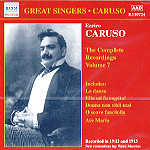Volume 7 brings us halfway through Naxos’ chronological survey of Enrico Caruso’s complete recordings, focusing on material from 1912-13. The goods more or less divide evenly between operatic ensembles and lighter, semi-classical solo fare. At this juncture in his recording career, Caruso already had set down most of the solo arias from his principal operatic roles. But the Duke’s Act 3 aria from Verdi’s Rigoletto and Des Grieux’s Act 1 declaration of love from Puccini’s Manon Lescaut fill in at least two gaps, and the performances are characteristically ardent and impassioned. So is Verdi’s Act 3 trio from I Lombardi that opens the disc, featuring Frances Alda’s gorgeously equalized soprano voice blending in effortless accord with the tenor and Marcel Journet’s focused, supple bass.
For ensemble cohesion and balance, the 1912 Rigoletto Quartet and Sextet from Lucia di Lammermoor score over Caruso’s 1908 versions (helped by Luisa Tetrazzini’s agile soprano). Yet Caruso’s hard-hitting opening solo in the Rigoletto number pales next to his 1906 and 1908 recordings (The Complete Caruso Volume 3), which find the tenor in suaver, less forced vocal estate. On the other hand, I prefer Caruso’s looser yet more dramatically alive remake of “O soave fanciulla” from Puccini’s La Boheme, mainly because the tenor meshes better with Geraldine Farrar’s full-throated style than with Nellie Melba’s staid perfectionism. The Caruso/Farrar team shines brighter in the Act 2 duet from Massenet’s Manon. In Verdi’s “Ai nostri monti” from Il Trovatore, Ernestine Schumann-Heink’s extraordinary mezzo-soprano voice proves every bit as phonogenic as that of her illustrious partner. And the great second-act duet from Don Carlo exemplifies the congenial rapport Caruso enjoyed with his friend and colleague Antonio Scotti.
The acoustic horn proved as sympathetic to violinist Mischa Elman’s rich tone as to Caruso’s timbre, as you readily hear in Massenet’s Elégie and Percy Kahn’s treacle-laden Ave Maria. However, Caruso’s atrocious command of sung English cannot even salvage his own composition, Dreams of Long Ago, let alone Sullivan’s once-ubiquitous-now-thankfully-forgotten The Lost Chord. Yes, world-famous tenors recorded dreck to make a fast buck long before Pavarotti teamed up with rock stars for stadium mega-concerts. Ward Marston’s transfers maintain the high quality of the previous six volumes in this series. If you already own these, you know what to do.
































